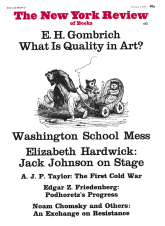In response to:
The Little Foxes Revived from the December 21, 1967 issue
To the Editors:
Oh Lord. Elizabeth Hardwick’s sated piece about Lillian Hellman’s plays. Preserve us all, when friendship tires like this.
Miss Hardwick is an old friend of Miss Hellman. (Miss Hellman is also a loved friend of mine. So is Mike Nichols, who directed the revival of her play The Little Foxes.) Our benighted intelligentsia has always behaved as though retaining any regard in print for such things, let alone mentioning them, were some sort of poor taste in priorities. It is supposed to be paltry to let fleeting private life get in the way of the timeless jackboot as it takes a swipe at your old mate’s face. Why? If a critic happens not to respect the work of someone he is fond of, what’s against shutting up?
There are a lot of things that puzzle me about Miss Hardwick’s piece. Most of all, I am baffled that she should complain about plays “that are addressed as much to the author’s conscience as to that of the audience.” Self-addressal is the poetic core of every good play I know, even Brecht’s. Directing yourself to the customer is whoring in the doorway. And Miss Hardwick’s doubts about the intelligence, energy, uncommercial motives, and radical fortitude of Lillian Hellman’s work make no sense whatever in the light of Miss Hellman’s life. They are also a dumbfounding judgment from someone who has chosen her company. I don’t see, for the life of me, how the fact of intimate alliance can be ignored in writing about someone’s work, let alone what obliges one to. Perhaps it is this—the effort to forget what can’t be forgotten and to disparage private knowledge that won’t be put by—that gives Miss Hardwick’s attack its undertone of eerie irresolution. All the same, it is hideous to read.
I suppose there might be something comic, given that we were all dead, about the inhumane acts of perfidy committed in print every week of the year by the Free World’s humanist intellectuals, who are often emotionally ruled by rivalry in the midst of their notional fret with capitalist competitiveness. The lewd assassination-compacts and exhibition betrayals of literary elites—worlds that can be quite as loutish as big-business when profit at the expense of another excites their old carcasses into action—can seem farcical as long as you are in a robust mood. At other moments they can make you wish to slide quietly out of metropolitan life for good to live in loyalty with an Eskimo and a cat. I know that bookish bitching has gone on for centuries, that it is worse in Europe than in America, and that some English poet three hundred years ago this very day was probably eating lark pie with an old all and then knifing him in the back in a broadsheet. I also realize that it is unsophisticated to find the intrigues more than mildly titillating. Mostly it makes me feel sick, the spectacle of clever, troubled, glutted men and women giving the names of people for whom they care to their own staleness with other ills. We stagger through life with the help of our friends, receive confidences, repose trust, behave mortally, and then turn into steel-clad men of ideas and rat on one another in some tone of grieved duty in the pretense that private commitment never occurred. Friendship is long and hard to obtain. The guise of sonorous remoteness that writers sometimes use to betray it in print is a board chairman’s emotion, and it comes cheap.
Penelope Gilliatt
New York City
Elizabeth Hardwick replies:
I have never met Penelope Gilliatt, nor have I ever spoken to her. She has no knowledge of my private feelings about anything, and no knowledge of my circle of friends. Perhaps one so self-congratulatory as she is in this letter can properly speak only of her own loved ones. The drama in question here is the one being performed in a New York theater, and not some imaginary, personal drama between Lillian Hellman and me, of which I know nothing.
The Mike Nichols production of The Little Foxes was widely praised; it is a great success. Much more important is the fact that the greatest critic in America, Edmund Wilson, published about it a fascinating and charming private letter to the director, Mike Nichols. This was entirely enthusiastic—and long, too!—and appeared in The New York Review on the very heels of my own piece. On the other hand, I am not alone among critics in having my doubts about Lillian Hellman’s work and this particular example of Mike Nichols’s work as a director. I should have thought simple professionalism would have accepted these differences of opinion.
Perhaps Miss Gilliatt doesn’t yet understand all there is to know about New York and the literary and intellectual world here. When we remember the number of unjustified slams and unwarranted raves, the way convictions sometimes cross uncomfortably, it is astonishing that relations remain as humorous, slap-dash, unparanoiac, and, above all, as pleasantly disorganized as they really are.
For my own part, I cannot imagine not writing about the revival of The Little Foxes. The play, the period, the plays written at the same time, the South in the 1900s, the theater in the Thirties—all of this is enormously interesting to me. Indeed I actually have the thought of writing more about the drama of the Thirties and Forties, and if Lillian Hellman’s work should come into that I would not hesitate to incur the wrath of Penelope Gilliatt by including it. I felt and still feel this work to be an appropriate subject for one who writes about the drama. That some of Lillian Hellman’s friends think otherwise—how can I know what to make of that?
This Issue
February 1, 1968



